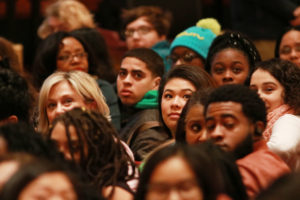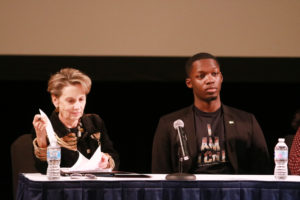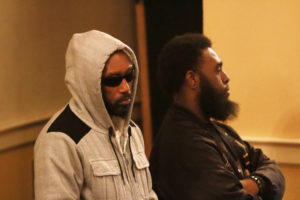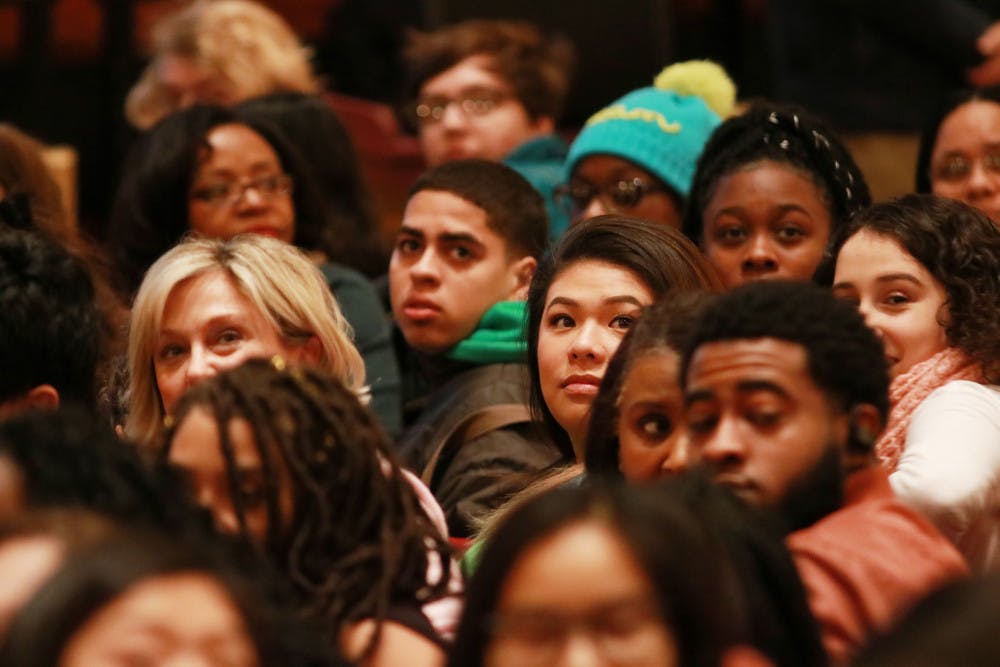By Connor Smith, Elizabeth Zakaim, Miguel Gonzalez, Emmy Liederman, & Gianna Melillo
Signal Staff
Within the past month, one student on campus was called various racial slurs from the third floor of Wolfe Hall and a building services employee encountered a racial slur while cleaning the Interactive Multimedia Building. Now, Campus Police has received a complaint about another racial slur –– a student, whose name has not yet been released, was the target of an alleged racist slur that, according to Campus Police, occurred on Friday Nov. 30 at 1:30 a.m at Landmark Americana in Campus Town.

Incident at Landmark Americana
Campus Police is currently conducting an ongoing investigation of the “incident of racial bias,” that occurred at Landmark.
According to Kyle Veale, Landmark’s director of operations, a student was called “the N-word” in the bathroom of the bar. Employees questioned everyone in the bathroom at the time, but no one came forward or took responsibility. The names of the people in the bathroom were given to Campus Police that same day, and Veale said that Landmark has been in touch with the student after the event occurred.
“This disappointing event has brought to light our need for additional sensitivity training that we will be putting in place,” Veale said. “We’ve worked really hard to create a fun and welcoming space for the TCNJ and Ewing communities to enjoy.”
According to College spokesperson David Muha, Landmark has cooperated in handing in security camera footage from that evening, which will now serve as evidence for the investigation.
However, according to Muha, Campus Police is limited in what it can do in terms of this incident, because it technically occurred off campus.
“By terms of our lease with the property manager, TCNJ Campus Police are responsible for responding to calls for service on the property,” Muha said. “They are only able to enforce actions that rise to the level of a crime under New Jersey or federal law.”
Muha still encourages people to report any incidents that arise.
“The college is committed to an inclusive campus environment where all members are valued and respected,” he said. “Anyone encountering hate speech should report it to Campus Police so that the College can take appropriate action.”
‘I Am TCNJ’
As a response to the recent incidents of racism at the College, Student Affairs, Academic Affairs and Student Government hosted a panel titled ‘I Am TCNJ’ at noon on Nov. 28 in Kendall Hall to address concerns about inclusivity on campus.
While the campus community crowded into Kendall Hall to take part in the event, coverage was also transmitted live to audiences in the Brower Student Center and in the Education Building Room 115.
The panel included College President Kathryn Foster, Ivonne Cruz, director of the Equal Opportunity Fund and Center for Student Success, Winnifred Brown-Glaude, chair of the African-American Studies Department, and Eashwayne Haughton, senior philosophy major and Student Government’s vice president of diversity and inclusion.

Foster relayed the College’s failure to properly deal with instances of prejudice both recently and in past years. She offered specific directives to help ensure more immediate changes both at an academic and administrative level.
“Many on campus labor consistently to make this campus a healthy, safe, welcoming and inclusive place ... but our racist incidents reflect that we are not yet healthy, safe, welcoming and inclusive to the level that we aspire to and must demand,” Foster said.
Foster spoke of her plan to appoint a vice president for inclusion on campus and elaborated on the need for an individual in administration to take charge with responding and preventing incidents of racial bias on campus.
“What’s important is that we have a person sitting on the cabinet that is reporting to the president, crafting and implementing a strategic agenda and waking up every day to work on these issues,” she said.
She went on to ask each member of the panel what they would expect from such an individual.
Cruz responded to Foster’s inquiry by emphasizing the need for protocol in situations of racial bias.
“We need to make sure the staff and faculty know where to go,” Cruz said of future incident reporting. “We have blurred the lines between feeling uncomfortable and unsafe on campus.”
Interim Vice President for Student Affairs Sean Stallings, the moderator at the forum, opened the floor for questions and feedback while Foster took diligent notes.
Many students and faculty members were adamant about having comprehensive training sessions for students, faculty, administration and Campus Police, that would address the importance of racial sensitivity.
“You can’t have one office holding the responsibility of changing the climate,” Brown-Glaude said. “We all have to be responsible. We’re going to need anti-racist training on this campus. It has to start from the top, all the way to the bottom.”
Community adviser Vanessa Jimenez, a senior history and secondary education dual major, felt that Residential Education’s student-staff also needed more deliberate training to help CAs better respond to incidents involving hate crimes or racial bias.
“I can attest to the fact that our training isn’t as valuable as it could be with inclusion and diversity,” she said. “It was a little better this year but it was more of a conversation about what inclusion and diversity is, less about how to handle conflict situations.”
Furthermore, as McKenna Samson, a sophomore English and African-American studies double major, and secretary of the College’s NAACP chapter pointed out, the College’s student conduct code does not include explicit information or guidelines about hate crimes or instances of prejudice.
The legal definition of a hate crime in the U.S. is one that “involves threats, harassment, or physical harm and is motivated by prejudice against someone's race, color, religion, national origin, ethnicity, sexual orientation or physical or mental disability,” according to USLegal.com.
When asked how she thought the forum went, Samson said she was filled with mixed emotions.
“I think it’s very productive that we’re having this conversation,” she said. “I wish it was longer –– they should dedicate an entire afternoon to this discussion.”
The members of the panel promised that this forum was only the beginning of a longer discussion of inclusiveness on campus.
“We will have action,” Haughton said. “This will not end here. I feel it with you. I can promise you we will continue to fight. This does not stop here. As students, as your peer, I feel you and I understand you. Keep holding us accountable. We will not allow this to be brushed under the rug.”
Another audience member happened to be the father of one of the students, Marcus Allen, who was recently verbally harassed on campus. On the night of Nov. 16, Allen and other African-American students, brothers of Alpha Phi Alpha Inc., were the targets of racial slurs coming from the third floor of Wolfe Hall. Aaron Allen, who said he worked at the College as a building services employee for about 15 years, gave an impassioned speech, demanding that the College take action so that his son would not have to feel unwelcome on his own campus.

“I pay this college and Campus Police way too much money for my son not to be protected and safe,” his father said, addressing the panel directly amid cheers and standing ovations from the audience. “You keep talking about words and all this, it looks pretty, it looks nice, but where are the actions at? I don’t want to hear about tomorrow, or next week, or ‘we’re going to have a meeting, we’re going to get a group.’ The group is right here. Look at all these people. These people are your group.”
He then stepped forward closer to the stage to address Foster directly, saying that administration in charge during his time as a business employee at the College did little to change the attitude of racism on campus.
“I’m telling you face to face,” he said. “You know what you did? You did what you’re doing now –– you sat down and never stood for nothing.”
Incident in the Art and Interactive Multimedia Building
While most of the campus was sleeping during the early hours of a chilly Thursday night, a building services employee was busy cleaning the third floor of the Art and Interactive Multimedia building, as she has been every Sunday through Thursday, for the past 11 years. She went about her routine thoroughly but quickly, in an effort to leave the dark building, where she often cleans alone.
However, at around 2 a.m. on Nov. 1, she was shocked to find a mess that she could not bear to clean –– a racial slur scribbled in what looked like magic marker next to a clogged toilet in the bathroom on the third floor.
“It’s not the first time ever, I’ve seen something like this,” said the employee, who agreed to the interview on the condition of anonymity. “It had to be erased.”
A police report filed last month details the racial incident that took place. A racist slur was written on the stall in the third floor women’s bathroom, with an arrow underneath pointing to a toilet overflowing with feces. According to police records, officers currently have no leads on the suspected perpetrators of the vandalism.
After Campus Police arrived and documented the incident, the building services employee had to call maintenance to help clean off the mess and unclog the toilet. As shocking as the encounter was, she said that it was not the first time she witnessed racial slurs in the form of graffiti in the IMM building. She said that about two years ago, she had seen other forms of vandalization and had also seen swastikas hanging on the walls of one of the bathrooms on the second floor.
“I feel upset about it,” she said. “I feel like I shouldn’t have to come to my job and see these types of things. Anybody, their work environment, their study environment, shouldn’t have to put up with that.”
The employee, who believes that majority of building services workers are African-American, feels that the slurs potentially target her and the other workers. Instead of witnessing instances of intolerance, she would rather people just walk away from the temptation to be antagonistic.
“Some people you’re going to get along with and some people you won’t get along with, but the main thing is you respect people,” she said. “I don’t care who or what you are, you respect people. That’s the bottom line. You don’t care for a person, leave that person alone, stay away from them.”
She wants to see a change in the College’s attitude toward minorities –– from both students and administration. She believes that Foster has the power to make a difference during her tenure and that her hands on attitude will serve her well in dealing with these incidents.
“We have to do something about this,” she said. “We have to come together and figure out something. Try to do something about this. Everybody, college wise, community wise, we all human beings. Derogatories and racial slurs, not matter what your culture, that should not be tolerated. It should not be tolerated. We have to take a stance. This is our college community.”
If people are willing to be open about their differences and accepting of each other’s diversity, she feels that true change is possible.
“Bring it to the light, bring it to the forefront so we can all discuss and listen (to) different ideas,” she said. “Even a lot of students might not even be aware of the history of different cultures. We should learn from it. If you don’t know –– ask.”
Students React
Students in attendance had much to say about the forum and the various incidents of racial bias.
Samson was one of the students involved in making a flyer disseminated this week that is calling for the boycotting of Landmark. The flyer claims that one of Landmark’s managers tried to cover up the alleged incident. The flyer also claims, and Landmark denies, that bouncers at the bar “used unnecessary physical force on two black students.”
Samson wants the campus community to be more aware of the increasing racial tension on campus.
“I want the campus community to see the way Landmark treats their patrons of color, especially those that should be treated as victims of hate crimes,” she said. “They need to be exposed for their poor business practices. For yet another person to be the victim of a very similar hate crime saddens me. As a black student, I have nothing but empathy for them. For people within the TCNJ community to go out of their way to call them such a disgusting slur angers me in the worst way.”
She had hoped that the forum would have done more to foster an inclusive and accepting atmosphere on campus.
“I feel like we just took two steps forward with the forum and now we’re taking five steps backwards,” she said.
Some were glad to have the open forum, but felt that more time could be dedicated to such discussion. Other students felt that more needed to be done to hold the students who spoke the racial slurs accountable for their actions.
“I expect to see a punishment,” said sophomore biology major Damion Anglin. “I expect to see something implemented to prevent this from happening again.”
Others felt that there was a need for more action.
“It is evident that action has to happen or nothing will change,” said Tara Cartier, a junior nursing major. “I feel that the College … is committed to taking action.”
Many students saw this forum as the first step to combating racism on campus and stressed the importance of follow-up and holding people accountable.
“I think the large volume of people who came out is indicative of the climate on campus in which many people not only feel uncomfortable, but unsafe,” said Danielle Parks, a senior philosophy major. “I think it is important that the forum took place, but I think we’re all still waiting to see what happens next, specifically to see what will happen to those students who committed this hate crime.”
Others felt that the forum could have gone more in depth to address the sensitive issues.
“The panel did a good job addressing issues ... though I felt the forum was a bit short,” said Cohere Elliston, a sophomore history major. He thought that a similar event should take place in the future to continue the dialogue. “I feel it was somewhat effective because people are talking about (race issues) but I think only people of color are the main ones talking, while a lot of white people aren’t as comfortable talking about it.”
Patricia Calderone, a senior philosophy and political science double major, appreciated the authenticity of those who spoke up during the discussion.
“I thought it was really informative and raw,” she said. “People got really vulnerable and opened themselves up … this time (the College) was forced to listen.”







